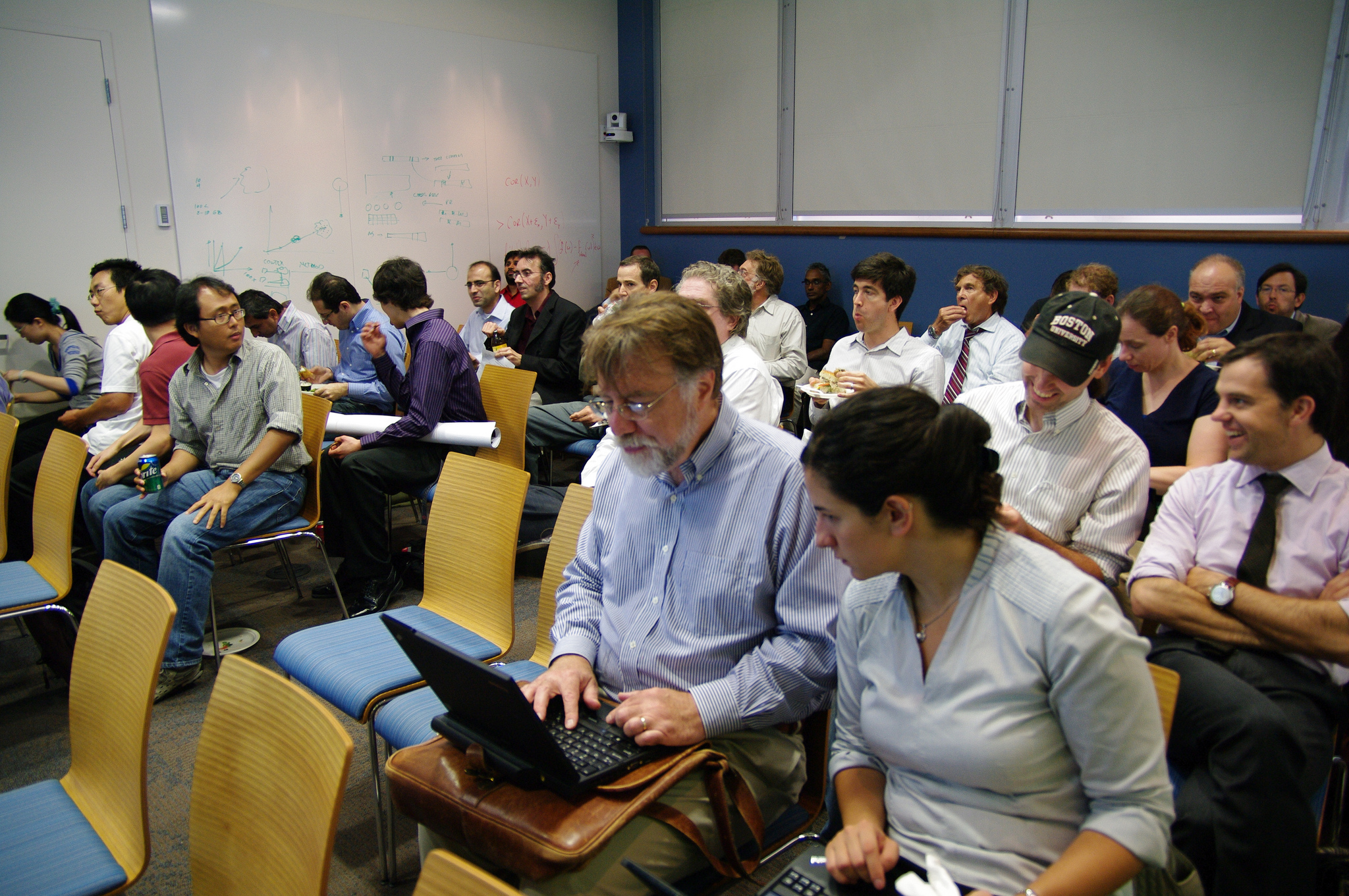
The MGHPCC consortium hosted a workshop, held on September 14, 2012 at the Hariri Institute for Computing and Computational Science and Engineering at Boston University, to provide an overview and update of the MGHPCC, short talks by 2011 MGHPCC seed-fund recipients, and an overview and discussion of the 2012 seed-fund program.
Often people ask us "what is the definition of high-performance computing (HPC)". A recent Massachusetts Green High Performance Computing Center (MGHPCC) workshop showed some examples that illustrate what HPC is all about. The workshop (which took place at the Hariri Institute for Computing and Computational Science & Engineering) brought together researchers who were awarded funds from the 2011 MGHPCC seed fund round and researchers interested in applying to the 2012 MGHPCC seed fund round. Both groups presented material on HPC research activities, providing a sampler that illustrates the many faces and facets of HPC. Talks spanned computational quantum chemistry to energy efficient data center architectures with stops at Earth science, cosmology, health science and accelerator programming along the way. In all 23 presentations were squeezed into the four hour meeting and participants left with a sense of both the depth and the breadth of current and future high-performance computing enabled research in and around the MGHPCC partnership. Some of the topics covered and highlights are described below.
Following an informal lunch and an introductory overview of progress at the Holyoke facility by MGHPCC Executive Director John Goodhue, the 2011-2012 Seed Fund Recipients shared their work and fielded questions about their projects in a series of 15 minute presentations.
First up, Hossein Mosallaei (NEU) and Nick Matreise (NEU), reported on their teams work with Dave Kaeli (NEU), and Tim Kaxiras (Harvard), "Multiscale Computation of Nanomaterials". Yanlei Diao (U Mass Amherst) gave a fascinating presentation "Massive Genomic Data Processing and Deep Analysis", about her collaboration with Li-Jun Ma (U Mass Amherst), Sam Madden (MIT), Bailin Wu (Harvard Medical School) and Yiping Shen (Harvard Medical School). Ayse Coskum presented work collaborating with Martin Herbordt (BU), and Guner Schirner (NEU) "Designing Green Software for High Performance Computing Clusters". Next Lorena Barba (BU) introduced "Tree- and Multipole-based Algorithms for High-Performance Computing", the work she and Cris Cecka (Harvard), and Hans Johnston (U Mass Amherst) have been tackling. Jonathen Appavoo (BU) spoke about a high performance fetal neuro-imaging application he is working on with P. Ellen Grant (Harvard Medical/ Children's Hospital) geared towards a two order of magnitude speed-up in diagnostic imaging. Alfredo Alexander-Katz (MIT), who has been working with Alan Aspuru-Guzik (Harvard), gave a round up the pairs progress towards understanding and being able to reproduce extremely efficient light-harvesting structures in their presentation "Organic Light Harvesting Antennas: Integrated Quantum and Statistical Approaches". Finally John Marshall and Pierre Lermusiaux (MIT), who have been collaborating with Amit Tandon (U Mass Dartmouth) and Amala Mahadevan (WHOI), together described their work "Multiscale Ocean Modelling in Support of the Pioneer Array".
After a short break to network, and share ideas as well as query members of the event organizing committee about specifics of the seed fund application process, there was an energetic session of 5-minute, lightening talks by groups interested in applying in the current round including:
• Summer Training: Institute for Reproducible Research with R (STIRRR)
Andrea Foulkes and Nicholas Reich (U Mass Amherst)
• The PEcAn Project: carbon-cycle reanalysis facilitated by model-data ecoinformatics
Michael Dietz (BU)
• Wildland Fire: Prediction, Planning and Mitigation Aided by Parallel Processing
Emanuel Melachrinoudis (NEU)
• High-throughput calculation of chemical reaction rates
Richard West (NEU)
• Development of Ground-Based Lidar Datasets to Monitor Forest Canopies and Biomass
Chrystal Schaaf (U Mass Boston), Alan Strahler (BU), Supriya Chakrabarti and Timothy Cook (U Mass Lowell)
• Investigating the conformational space of proteins using Molecular Dynamics simulations
Nurit Haspel (U Mass Boston)
• The Massachusetts Open Cloud (MOC)
Orran Krieger (BU)
• Enhancing Open Stack to Enable HPC and Big Data Applications
Orran Krieger (BU), and Prashant Shenoy (U Mass Amherst)
• Petascale Simulations of Type Ia Supernovae
Robert Fisher (U Mass Dartmouth)
• Solving Electrostatic Problems in the Context of Nuclear Physics Experiments
Joseph Formaggio (MIT), and Noah Oblath (MIT)
• Computational simulations of interfacial flows with application in energy conversion and materials processing
Mehdi Raessi (U Mass Dartmouth)
• High Performance Computing of Molecular Interactions: Protein Docking and Mapping
Dmitri Beglov, Dima Kozakov, and Sandor Vajda (BU)
• Exploring the Dark Matter Substructure of Milky Way Galaxies
Anna Frebel (MIT)
Afterwards the MGHPCC Research, Education and Outreach Committee (Rick Adrion, U Mass Amherst, Azer Bestavros, BU, James Cuff, Harvard, Chris Hill, co-chair (MIT), Dave Kaeli, NEU, and Jim Kurose, co-chair, U Mass Amherst ) hosted a Q&A session.
The committee was especially pleased by the broad range of projects pitched and looks forward to picking the coming year's recipients. Their challenge, not surprisingly, will be how best to support a "quasi-infinite" wealth of good ideas using finite resources - maybe they could use some HPC technology to help!
The deadline for one page pre-proposals is October 1st, 2012. A total of $500K is available with anticipated award sizes in the range of $50K – $150K. Proposals must involve investigators from two or more of Boston University, Harvard University, the Massachusetts Institute of Technology, Northeastern University and the University of Massachusetts system.
The Massachusetts Green High Performance Computing Center (MGHPCC) is a collaborative effort involving Boston University, Harvard, M.I.T, Northeastern and The University of Massachusetts. In addition to working together to build and operate a state-of-the-art research computing facility in Holyoke, MA, the universities also sponsor a research consortium seed-fund program broadly in the area of high performance computing. The seed-fund program seeks to catalyze sustained cross-institution research collaborations. The seed fund supported more than $500,000 in research activities in 2011. A second-round seed-fund program is being sponsored in 2012, with approximately $500,000 of seed funding again available.